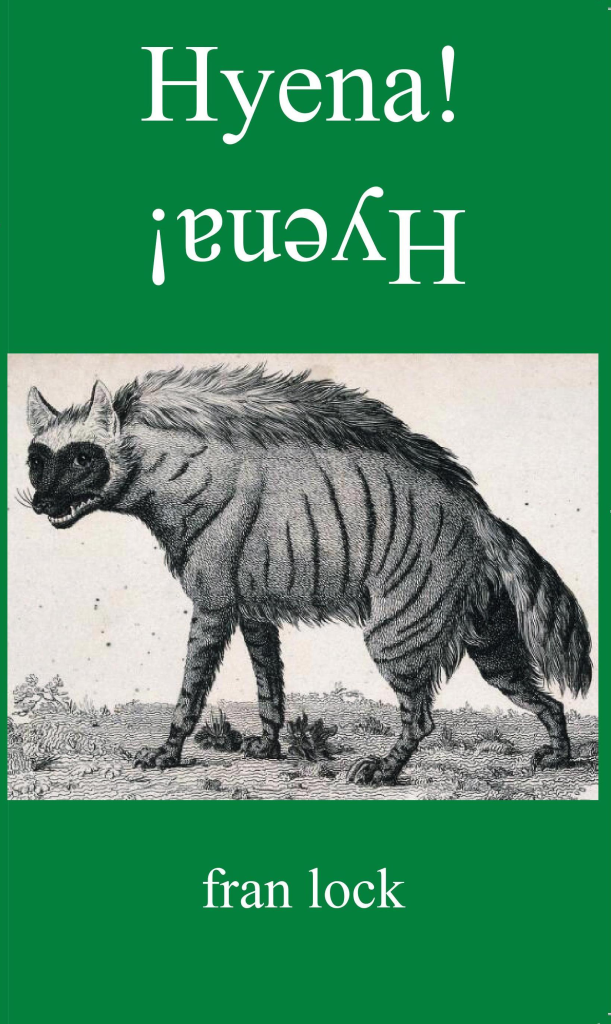Hyena! (Shortlisted, TS Eliot Prize 2023)
Fran Lock
(The Poetry Bus, 2023); pbk, £8.50
‘This human form where I was born, I now repent’. This quote from Pixies ‘Caribou’ sets the tone for Fran Lock’s Hyena!, an intoxicating blend of the melancholic and the apocryphal, a charged, crudely honest, experimental, and intricate exercise in reflection. The collection is dedicated to Scottish poet Roddy Lumsden, whose own collections were shortlisted for the T.S. Eliot Prize. Lumsden also worked closely with Lock as her editor before he passed away in January of 2020. Eleven of the poems in Hyena! are contained in a section called ‘After Roddy Lumsden’.
It is a testament to Lock’s writing skill that a collection of 82 poems feels consistently fresh and exciting, with continuing experimentation in lineation, punctuation, and grammar. Her punctuation is emphatic, and the rhythm is often broken. Black Friday contains many examples of this:
[…]the tv’s
bland incitements. johnson’s mouth,
a gimmicked sleeve. dandelion
and atomised, we barely breathe.
to walk. the war dead are indifferent
as the grey decades that scale them.
The precise collision of events and images emphasize mood and atmosphere, and the punctuation creates these tight sentences that resemble nervous breathlessness.
Hyena! is a dense but rewarding read. Lock doesn’t shy away from challenging the reader and this only strengthens the personality of the collection. In an interview with Poetry School, Lock describes her own writing process as feral. This can be seen in the collection’s style, particularly in the shape-shifting voice of most of the poems. The poems jump from one image to another that collide to create an impression of a feeling or line of thought. This jerkiness should not be construed as a lack of ability but, instead, a keen awareness of speaker’s voice—an awareness that becomes clear in the poem, ‘Sid James at the poetry society’. Here the wandering, frenetic speaker of the other poems gives way to the colloquial but confident speaker, presumably the perceived public persona of Sid James.
Counter-conventional and counter-cultural, Lock’s brand of punk feminism is baked into the collection’s core in the unabashed subversion and rebellion against tropes and conventions both poetic and cultural. In ‘Mina Harker to her Stalker’, the titular character, loved in the original Bram Stoker text for her innocence and purity, says a great big cathartic ‘fuck you’ to her stalker. Interspersed between other poems, the image of the hyena continually develops as an image of internal turmoil and desire, particularly in relation to femininity.
Throughout Hyena! a speaker shifts between human and hyena, between the external and internal, and highlights the difference in the speaker’s outer persona and internal one. It is assumed that this internal personality is more honest than the human persona. ‘Hyena Q&A’, however, places the hyena’s development throughout the collection as a sort of performance, and by using the the Q&A format—associated with interviews with filmmakers, musicians, writers, actors, artists etc—situates the hyena’s development as a sort of performance. The poem is a fitting ending to the hyena’s development, with Lock’s characteristic upheaval of expectations adding more complexity and ambiguity to the image.
The power of Hyena! lies in this countering of expectations as well as in the vividly repulsive imagery; the opening line of ‘To Live on Dread’ is one of many examples of Lock’s distinctively unsettling imagery:
my mind is a fucking scorpion orgy, coerced into a cartwheel by lack of
sleep.
Hyena! is a collection that sticks around long after you have finished… one to keep going back to, to keep mining for days on end. I know that I will always find something new when I return to different poems. And I would also highly recommend checking out Fran Lock’s interview with the Poetry School.
Shannon O’Donnell


Leave a Reply